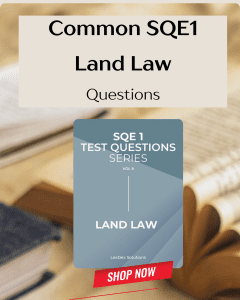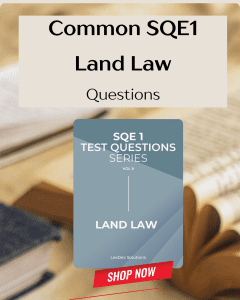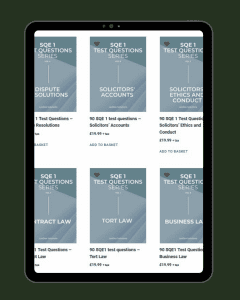Land Law has long been one of the most intimidating areas for aspiring solicitors preparing for the SQE1 exam. The subject is notoriously dense, filled with technical rules, detailed statutory provisions, and complex case law that often requires students to carefully balance theory with application. Many candidates find that while they can recall principles in isolation, they struggle when these principles are embedded into long and detailed scenario-based SQE1 questions. Understanding how to approach these questions is not just about memorisation, but about learning to untangle legal relationships, spot hidden issues, and apply doctrine to fact patterns in a structured, exam-ready way. This guide takes you through the most common SQE1 Land Law questions and offers practical strategies on how to answer them effectively.
1. Freehold and Leasehold Estates
One of the most frequent areas tested in SQE1 Land Law involves distinguishing between freehold and leasehold estates. Candidates are often presented with scenarios where an arrangement is described in everyday language, leaving it to the test-taker to determine whether it constitutes a lease, a licence, or some other interest. The classic trap here is overlooking the requirements of exclusive possession, certainty of term, and consideration, as highlighted in cases such as Street v Mountford. When answering such a question, you must carefully identify whether the occupier has real legal rights or only personal contractual rights. A strong approach involves breaking the problem into elements — possession, duration, rent — and methodically applying them to the facts.
2. Co-Ownership and Trusts of Land
Another common area of questioning is co-ownership, particularly around joint tenancy and tenancy in common. The SQE1 frequently tests a candidate’s ability to spot whether the equitable ownership has been severed, whether statutory formalities have been met, and how the Trusts of Land and Appointment of Trustees Act 1996 (TOLATA) applies. For example, a scenario may involve family members purchasing property together but later falling into dispute about sale or division. Here, it is essential to know the difference between legal and equitable ownership and how courts handle disputes under TOLATA. In tackling these questions, always identify the type of ownership, check for any express declarations, and then consider statutory rights and remedies available to each party.
3. Proprietary Rights and Interests
A recurring feature of SQE1 questions is the distinction between legal and equitable rights. Students often confuse the requirements under the Law of Property Act 1925 and the Land Registration Act 2002 when deciding whether an interest binds successors in title. For example, an equitable easement or restrictive covenant may be enforceable if properly protected by registration or if it falls under overriding interests. These questions require precise knowledge of how and when interests must be registered and the consequences if they are not. When faced with such scenarios, create a mental checklist: identify the right, classify it as legal or equitable, check registration requirements, and then conclude whether it binds.
4. Mortgages and Borrower Protections
Mortgages are another high-yield topic for SQE1 Land Law. Candidates may encounter fact patterns where a borrower challenges the enforceability of terms, alleging undue influence, unconscionable bargains, or failure to comply with statutory duties. Classic case law such as Royal Bank of Scotland v Etridge is often central to such questions. These scenarios test not only technical knowledge but also the ability to balance lender rights against borrower protections. To answer effectively, you should first establish whether the mortgage is validly created, then consider whether any equitable or statutory defences are available to the borrower.
5. Adverse Possession
Adverse possession remains one of the most challenging areas for students because of its complex interaction between common law and the Land Registration Act 2002. Many SQE1 questions present scenarios where an individual has been in long-term occupation of land and now claims ownership. The key is to distinguish between registered and unregistered land, as the requirements differ significantly. For registered land, adverse possession requires not just factual possession and intention to possess but also a successful application after 10 years, which may be contested by the registered proprietor. When answering, always highlight the statutory framework, consider limitation periods, and address whether the occupier’s conduct demonstrates the necessary intention.
6. Easements and Covenants
Easements and covenants are perennial favourites in SQE1 Land Law questions, often appearing in the form of rights of way, rights to light, or restrictions on land use. The traps here lie in determining whether the claimed right satisfies the requirements for an easement, such as those established in Re Ellenborough Park, or whether a covenant is enforceable by successors. A common mistake is failing to differentiate between positive and negative covenants or between the benefit and burden of covenants. Answering these questions requires structured analysis: first establish the nature of the right, then assess validity, enforceability, and finally consider registration or notice requirements. A methodical, case-driven approach is often rewarded in the exam.
Common SQE1 Land Law questions are designed not to test rote memorisation but to challenge your ability to apply rules to nuanced scenarios. The subject’s complexity lies in the interconnection of doctrines — leases, co-ownership, mortgages, and registration — and the examiner’s tendency to weave multiple issues into a single fact pattern. Success therefore depends on practising scenario-based questions, developing a step-by-step analytical framework, and being vigilant about common traps. Remember, the goal is not just to spot the issue but to reason through it systematically, showing awareness of both statutory frameworks and case law. By adopting this structured method, you can turn Land Law from one of the most intimidating SQE1 subjects into one of your strongest areas.
FAQ:
1. What types of Land Law questions appear in SQE1?
Land Law questions in SQE1 typically involve leases, co-ownership, proprietary rights, mortgages, easements, covenants, and adverse possession. They are often scenario-based and test your ability to apply legal principles to complex factual situations rather than recall rules in isolation. Candidates must show they can analyse and structure answers logically. Case law and statutory frameworks such as the Law of Property Act 1925 and Land Registration Act 2002 are central. The key challenge is managing time while addressing multiple issues hidden in one scenario.
2. How can I prepare effectively for SQE1 Land Law questions?
The best preparation involves practising a wide range of scenario-based SQE1 questions, not just memorising textbook definitions. You should work with practice materials that simulate exam conditions and include detailed explanations. It is also important to create checklists for each topic, such as requirements for a lease or the steps in adverse possession. Revising key cases like Street v Mountford and Royal Bank of Scotland v Etridge can help with issue-spotting. Finally, review past questions and identify where you commonly make mistakes.
3. What are the biggest mistakes candidates make in SQE1 Land Law?
One common mistake is confusing legal and equitable rights, especially in registration-related questions. Another is failing to distinguish between leases and licences, which often appear deceptively similar in fact patterns. Many candidates also overlook equitable defences in mortgage questions or misapply the rules for adverse possession in registered land. Time management is another trap: students sometimes spend too long on one issue, leaving others underdeveloped. The solution is practice and developing a structured, time-conscious approach.
4. How can I spot traps in SQE1 Land Law multiple-choice questions?
Traps often lie in small factual details such as the duration of occupation, the presence of exclusive possession, or whether registration formalities have been met. Some questions test your ability to apply rules to unusual circumstances, which may feel counterintuitive. Always slow down and read the scenario carefully, highlighting the facts that change the legal outcome. Use a step-by-step framework rather than relying on instinct. This prevents you from falling into common examiner tricks.
5. Are Land Law questions harder than other SQE1 topics?
Many students consider Land Law among the most difficult subjects due to its technical nature and heavy reliance on both statute and case law. Unlike subjects that may feel more intuitive, Land Law requires precise application of rules. However, with consistent practice and exposure to realistic scenarios, candidates often find they can master it. The key is not to avoid the subject but to embrace its complexity with structured revision. By doing so, you can turn a challenging topic into a strong point.
Ready to master the toughest Land Law questions in SQE1?
At LexDex Solutions, we provide expertly designed scenario-based practice materials that reflect the exact style and complexity of the exam. Our guides, templates, and detailed explanations will help you move beyond theory and develop the applied skills examiners want to see. Don’t leave your preparation to chance — give yourself the structured advantage today.
Explore our Land Law SQE1 training materials and start practising smarter, not harder.
Land Law is only one part of the SQE1 journey. To succeed overall, you need structured resources that cover ethics, dispute resolution, constitutional law, and solicitors’ accounts. At LexDex Solutions, we provide comprehensive training materials, mock questions, and professional templates to give you the full confidence needed for exam day. Strengthen your Land Law knowledge while ensuring every subject is covered in depth. Explore more of our SQE1 resources right here.
While mastering Land Law is vital for SQE1 success, professional readiness extends beyond exams. A polished, recruiter-ready CV can make the difference when applying for training contracts or legal positions. That’s where Lawlio comes in — offering expertly designed CV templates tailored for students and aspiring solicitors. Combine your SQE1 preparation with a strong professional profile, and you’ll be fully equipped for the next step in your legal career.


